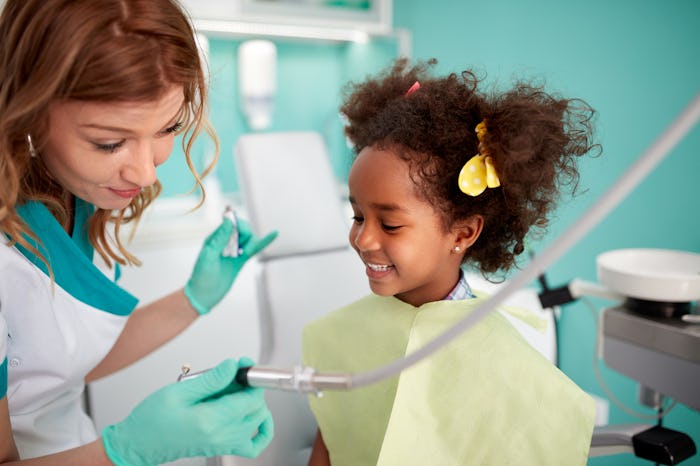Life

Here's What You & Your Kid Can Expect At Their Very First Dentist Appointment
Soon after your kids are born, you learn to become a pro at navigating all their health care issues. From well visits to sick visits, you know exactly what to expect at their doctor’s office, and you know how to prepare accordingly. But when your child’s teeth start coming in, you’ll need to start a new dental care routine, which will include dental visits. So if you aren’t sure about what to expect, and want to be fully prepared, you should know what happens at a child’s first dentist appointment.
In an interview with Romper, Dr. Lorra Cantú Lindsey, a pediatric dentist with AOMS Pediatric Dentistry in Amarillo, Texas, says that at the first dental visit, you can expect your dentist to discuss your child’s detailed medical history, drug allergies, any concerns the parents have, and take specific X-rays (depending on the age of the child) if needed. “It’s a good rule of thumb is to arrive a few minutes early to fill out any needed paperwork,” she suggests, “and bring your child’s medical and dental insurance information and a list of your child’s allergies.”
Your baby’s first dental visit should be within the first six months after they spring their first tooth or by their first birthday, as recommended by the American Dental Association (ADA), so that your pediatric dentist get familiar with your family and vice versa. Lindsey says that it is important to start children on a regular dental schedule early, because this will set them up for optimal dental health and it will also help prevent any dental anxiety.
In these early visits, noted the ADA, your dentist will evaluate your child and advise you on best dental care routine for their specific needs, including maintenance and preventive measures. “We focus on prevention through education,” says Lindsey, “as cavities are even more common than asthma.” She says that your pediatric dentist will give you information and guidance on the best routine for your child’s oral hygiene, specifically flossing and brushing at a minimum of twice a day and the use of toothpaste with fluoride.
Although you may not have thought it was relevant, your dentist might even want to discuss your child’s diet at that first appointment. Lindsey explains that she puts an emphasis on the importance of a child’s diet, because on a daily basis, she sees more and more children come in with interproximal decay. She notes that this type of tooth decay can be caused by the over usage of sipping from a bottle or sippy cup, or from constant snacking on high carb foods such as fruit snacks, cookies, or crackers. “Depending on the child's needs,” she adds, “we will offer modifications to diet and the use of additional fluoride.”
In preparation for your child’s first dental visit, Lindsey recommends starting with a good oral hygiene routine when their first tooth comes in. She says you can start with brushing your child’s tooth for about 30 seconds, twice a day, and then slowly transitioning to two minutes. To help instill good oral hygiene habits, Lindsey suggests making your child’s brushing experience fun with creative games, a sticker chart, choice of fun toothbrush and toothpaste options, and by praising your child after they brush. Keep this oral hygiene routine going and after six months, Lindsey suggests making that first dental appointment. “A child’s first dental visit should be six months after the first tooth grows in,” she explains, “and then appointments should be scheduled for every six months after that.”
Now that you know what to expect from your kid’s dental journey, you should start looking for a good pediatric dentist in your area that is the right fit for your family. Many offices have kid-friendly environments with colorful murals and engaging toys to help keep kids settled and calm. So, if you find the right dentist, maintain good oral hygiene habits, and start early preventative care, that first trip to the dentist should be a piece of cake.
Check out Romper's new video series, Bearing The Motherload, where disagreeing parents from different sides of an issue sit down with a mediator and talk about how to support (and not judge) each other’s parenting perspectives. New episodes air Mondays on Facebook.